
Miscanthus:
The number one when it comes to renewable resources!
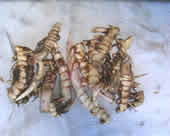
Planting material

Planting using a semi-automatic planter
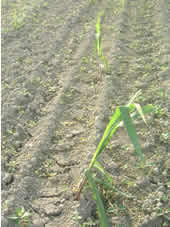
The crop, 1 month after bedding out
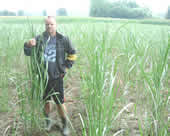
The crop, 4 months after bedding out
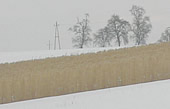
The crop in the winter
|
Miscanthus x Giganteus
The Miscanthus Giganteus is also known as Chinese silver grass
or Elephant grass.
Once planted and you can harvest at least twenty years!
Miscanthus is a very economical
and ecological plant: Once planted and you do not have to
look after it for the next twenty years. You don't have to
fertilize, irrigate of treat it with pesticides. The only
annual costs are the harvest costs.
Miscanthus is a C4 - plant. These kinds of plants grow very
fast and live a long time. Once the Miscanthus is planted,
it sprouts itself every year. One may expect that the rootstock
in the ground will sprout for 20 to 25 years again and again.
Miscanthus does not grow seeds in Central Europe. Therefore,
the propagation is vegetative.
For this purpose we breed rhizomes you may either plant by
hand or by using semi-automatic planters. For one square meter
only one single rhizome is necessary. That means that for
one hectare (11960 square yards) 10.000 rhizomes are required.
Ideally, the rhizomes are bedded out in April.
|
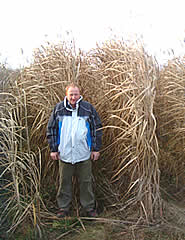
The crop in the second year (late autumn) |
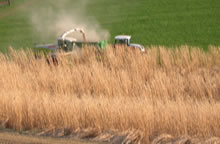
The harvest using a corn harvester
The crop
One hectare (11960 square yards) of Miscanthus results
in a raw material crop of approximately 15 tons dried
Miscanthus.
When burning this amount it corresponds to a heat
value of approximately 8.000 liters fuel oil. 2, 23
kilos Miscanthus with about 15% water at harvest time
in spring corresponds to a heat value of one liter
fuel oil. |
|
Basically, the Miscanthus
manages to survive without fertilization. Miscanthus grows
well in soil that is also well suited for corn. Temperatures
of minus twenty degrees Celsius are no problem for these plants.
However, during the first two years after planting weeds must
be taken care of. The Miscanthus tolerates all pesticides
that are used to protect corn. In the third autumn the Miscanthus
loses so many leaves that weeds cannot grow again. Therefore,
there are no further expenses for pesticides.
Miscanthus may be harvest for the first time in the spring
after planting. In winter the plant has sufficient time for
drying; the leaves and sprouts fall off and the plant dries
out to a water content of approximately ten to fifteen percent.
Miscanthus may be harvested using with a corn harvester or
a cutting unit and a large-scale baler. |
What is Miscanthus used for?
As fuel
The simplest possible use is to burn of the plant in order
to heat
.
As garden decoration
Hackled Miscanthus is ideal for decorating and fertilizing
your garden. It replaces bark mulch.
As substitute for straw in strawberry cultures
Miscanthus is a perfect substitute for straw in strawberry
fields.
|
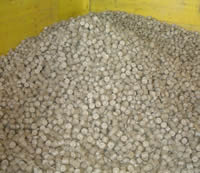
Miscanthus may be pressed to briquettes WITHOUT any binding
material. |
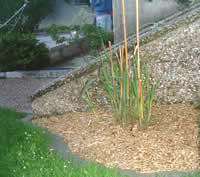
Miscanthus as cover material in the garden |
As bedding for animals
Cleaned and hackled Miscanthus provides good bedding for horses
and small animals.
As substitute for turf
Defibrated and fermented Miscanthus may be used as a substitute
for turf planted in flower soil.
As building material
Miscanthus is well suited for producing various building materials.
It is used for production of pavements and insulating boards,
wall filling in prefabricated buildings, and for manufacturing
bricks.
|
As fuel and substitute for plastics
Well-known companies, such as Shell, are currently
involved in the development of technologies for the
production of fuels and for substituting plastics
using Miscanthus.
|
We are available for advice and deliver first class and
certified planting material!
Order plant material in time for the planting season
2010!
|
________________________________________
 |


